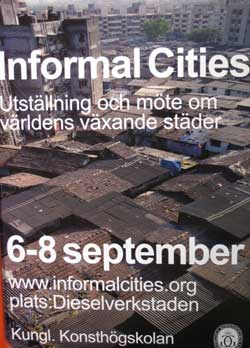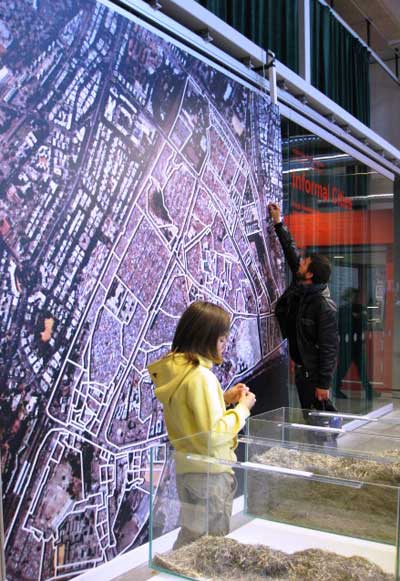SWEDISH SOUTH ASIAN STUDIES NETWORK

INFORMAL CITIES – a brief report
by Maria Tonini, SASNET
 From the 6th to the 8th September 2008, several professionals from various countries participated to the symposium ‘Informal Cities’, organised by the Royal University College of Fine Art in Stockholm, in collaboration with Shack/Slum Dwellers International (SDI) and Sida’s Division for Urban Development.
From the 6th to the 8th September 2008, several professionals from various countries participated to the symposium ‘Informal Cities’, organised by the Royal University College of Fine Art in Stockholm, in collaboration with Shack/Slum Dwellers International (SDI) and Sida’s Division for Urban Development.
The object of the symposium was to investigate certain aspects of urban growth, namely urban poverty and livelihood issues in the slums all over the world. Starting from the premises that urbanization is growing at a worrying pace worldwide, and that slums are, in fact, ‘informal cities’ with a definite and dynamic identity, the participants from various fields (artists, architects, planners, academics, NGO representatives) were invited to share their thoughts and envision ways to improve livelihood without destroying communities. The event also comprised an exhibition with pictures and films realised by the artists from the Royal University College of Fine Art.
| The intention behind the international symposium on urban growth was to form a meeting place where representatives of grass-roots organizations from seven informal cities shared their experiences together with renowned scholars and activists such as Saskia Sassen, David Satterswaithe, Barbara Southworth, Sheela Patel and Jockin Arputham. Screenings, discussions, workshops and presentations were held during a Symposium while the cities, the inhabitants and their stories were presented in a parallel Exhibition. Activists, decision makers, stakeholders, architects, politicians, artists, and researchers were invited to share their experiences and participate in a common effort to formulate possible solutions for a socially, environmentally and economically sustainable urban development. Venue: Dieselverkstaden, Marcusplatsen 17, Sickla, Nacka. Conference web page: http://www.informalcities.org/ |
The key speakers in the symposium were not academics but slum dwellers from several countries: India, Philippines, Malawi, South Africa, Kenya, Brazil. On the first day, each representative presented his/her story, illustrating the challenges and threats, but also the community actions undertaken to ensure better standards of live for the slum dwellers.
It has emerged that significant progress has been made through the establishment of federations of slum dwellers, who initiated various projects, such as saving schemes, negotiation with the government to ensure the right to live and work, resistance actions to counter property developers who seek to demolish slums and evict people.
The second day of the event was organised as an open workshop for exchanging ideas and gaining insights. The issues being discussed included: land access for the poor, forced eviction and relocation, the role of public spaces in slums, health and sanitation, role of grassroots organisations, political will and negotiation. The results of the workshop formed the basis for a summary of themes to be presented to the politicians, who joined the think tank on the third and final day. The latter were invited not to give speeches but instead to ask questions that would be then discussed with the slum dwellers and the participants. Politicians were also called to reflect on Sweden’s present and future role as a country involved in international development initiatives.
In keeping with its title, ‘Informal Cities’ favoured an informal and dynamic exchange of views and ideas. Rather than focusing on drawing conclusions or drafting recommendations, the event stressed the importance of listening and learning from the experiences of people from different countries and backgrounds.
SASNET - Swedish South Asian Studies Network/Lund
University
Address: Scheelevägen 15 D, SE-223 63 Lund, Sweden
Phone: +46 46 222 73 40
Webmaster: Lars Eklund
Last updated
2008-09-11
